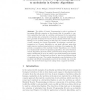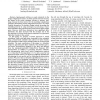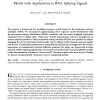555 search results - page 71 / 111 » Decompositions of Grammar Constraints |
EUROGP
2007
Springer
14 years 2 months ago
2007
Springer
The ability of Genetic Programming to scale to problems of increasing difficulty operates on the premise that it is possible to capture regularities that exist in a problem environ...
CVPR
1998
IEEE
14 years 10 months ago
1998
IEEE
A new approach to the recognition of temporal behaviors and activities is presented. The fundamental idea, inspired by work in speech recognition, is to divide the inference probl...
INFOCOM
2003
IEEE
14 years 1 months ago
2003
IEEE
— Input-queued switches are used extensively in the design of high-speed routers. As switch speeds and sizes increase, the design of the switch scheduler becomes a primary challe...
ICCV
2009
IEEE
15 years 1 months ago
2009
IEEE
Supervised learning of a parts-based model can be for-
mulated as an optimization problem with a large (exponen-
tial in the number of parts) set of constraints. We show how
thi...
RECOMB
2003
Springer
14 years 8 months ago
2003
Springer
We propose a framework for modeling sequence motifs based on the maximum entropy principle (MEP). We recommend approximating short sequence motif distributions with the maximum en...




